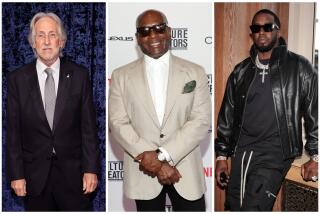Class-Action Suit Targets Top Tobacco Companies : Courts: Filing blames manufacturers for deaths of millions of smokers and accuses them of spiking nicotine content of cigarettes. Industry says lawyers are jumping on âpublicity bandwagon.â
SAN FRANCISCO â A team of lawyers on Wednesday launched a bid to hold tobacco companies accountable for the deaths and suffering of millions of smokers, claiming that manufacturers intentionally increase nicotine levels in cigarettes to keep their consumers hooked.
In a landmark class-action lawsuit filed in New Orleans, the attorneys contend that Philip Morris Companies Inc., R.J. Reynolds Tobacco Co. and four other manufacturers secretly spike their product so addicted smokers will continue to buy it and their profits will rise.
âCigarettes kill,â said San Francisco lawyer Melvin Belli, a veteran of two unsuccessful lawsuits against tobacco companies. âWe will prove that the tobacco industry has conspired to catch you, hold you and kill you--all without a moment of remorse or self-examination.â
The lawsuit was filed by lawyers from 26 firms specializing in class actions, many of whom represented victims in the just-settled, $3.75-billion case against makers of silicone gel breast implants.
Attorneys said their decision to take on the tobacco industry was motivated by two factors. In February, ABC News reported that manufacturers boost the nicotine level of their product by adding a tobacco flavoring to a portion of the tobacco used in cigarettes. The report cited former industry executives and was supported by a laboratory study paid for by ABC.
More recently, Food and Drug Administration Commissioner David A. Kessler called nicotine âhighly addictiveâ--a charge consistently denied by tobacco companies--and suggested the government might regulate it as a drug. Last week, Kessler told a congressional subcommittee that âaccumulating evidenceâ suggests that cigarette producers control nicotine levels in a manner that âcreates and sustains an addiction.â
Philip Morris executives, who hit ABC with a $10-billion libel lawsuit after the networkâs broadcast, said Wednesday they do not artificially enhance the nicotine content of cigarettes.
âThe underlying foundation of this (class action) lawsuit--that we add nicotine to our product--is simply not true,â said Gary Long, an attorney for Philip Morris. Belli and his fellow lawyers, Long said, are simply âjumping on the publicity bandwagon to see if thereâs something there.â
A spokeswoman for R.J.R. Tobacco Co. agreed, and said the tobacco manufacturing process actually reduces the nicotine in cigarettes. Spokeswoman Maura Ellis also rejected the lawsuitâs claim that cigarettes are addictive.
âThere are more former smokers in America than there are current smokers,â Ellis said. âThe great majority of them quit without any aid or support group.â
Since the 1950s, more than 320 health-related lawsuits have been filed against tobacco companies. Most of the cases have been dismissed, and all but one of those that have made it to trial were won by the tobacco industry.
Typically, juries have found that smokers indulge in their habit based on their free will, and that label warnings advising consumers of risks insulate tobacco companies from liability.
Lawyers pursuing the class-action suit say the new information changes the legal picture.
âNow we have evidence that the issue is not an issue of free will, because of the addictive qualities of the cigarettes and the manipulative acts of the tobacco companies,â said Richard Heimann, a noted San Francisco attorney. âFor years, these companies have made misleading statements about their product and have concealed their deliberate manipulation of nicotine levels.â
Heimann said Wednesdayâs suit marks the first time a class action has been brought against the tobacco industry. The case has three named plaintiffs--longtime smokers Ernest Perry and George Solomon, and Dianne Castano, a widow who blames her husbandâs death on cigarettes. But because it is a class action, the lawsuit is also filed on behalf of untold millions who may have suffered similar harm.
The lawsuitâs aim is to compensate victims for economic losses caused by their alleged addiction, Heimann said. Such losses would include money spent on cigarettes, and also the costs of counseling or other assistance a person required in order to quit.
Compensation for cigarette-caused health problems will also be sought, but winning money for such injuries is difficult in class-action suits because each individualâs experience is so different, Heimann said.
At the request of the lawyers, a U.S. District Court judge Wednesday ordered the tobacco companies not to destroy or alter records that might relate to the case. Also named as defendants are The American Tobacco Co., Lorillard Tobacco Co., R.J.R. Nabisco Inc.--the parent of R.J.R. Tobacco Co.--and the Liggett Group.
The lawsuit is the latest in a series of blows suffered by the $48-billion tobacco industry, which has seen sales decline about 2% annually since 1984. In recent months, several fast-food chains have banned smoking in their restaurants, President Clinton has proposed a cigarette tax increase to finance health care reform, and the U.S. Department of Labor is moving to outlaw smoking in all workplaces.
More to Read
Inside the business of entertainment
The Wide Shot brings you news, analysis and insights on everything from streaming wars to production â and what it all means for the future.
You may occasionally receive promotional content from the Los Angeles Times.










